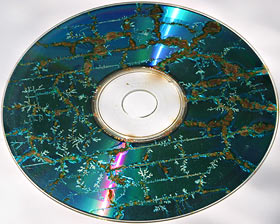
Atomic I/O letters column #150
Originally published 2014, in PC & Tech Authority(in which Atomic magazine is now a section)
Reprinted here July 28, 2014 Last modified 16-Jan-2015.
Macerating in microwaves
A while ago I figured out that when my old (VERY old) microwave oven is heating something, I can't connect to Wi-Fi within five metres of it. I presumed that since Wi-Fi and microwaves both use 2.4GHz, one with a tiny amount of power and one with a lot, it'd only take a very small amount of leakage from the oven to interfere with the network, so it wasn't anything to worry about.
I was just browsing the Web on my iPhone while nuking my dinner, though, and the phone froze, had to be hard-reset. I brought it closer to the oven again because I am dangerously curious and it happened again. I reckon this is much worse than just network interference.
My question is: How dangerous is this? Am I now going to have two-headed children?
Lech

Seven seconds on high turns a terrible DVD into something much more interesting to
look at.
Answer:
Yes, I'd get a new microwave, but not because the leakage poses any health risk.
It doesn't take a lot of electrical energy in the wrong place to crash a computer. Your iPhone is a computer - even the original 2007 iPhone was a faster computer than existed anywhere in the consumer market ten years earlier - and it is conveniently furnished with a Wi-Fi antenna. Which is, as you say, well-designed to receive the leakage from an oven or other 2.4GHz devices, as well as the signals you actually want.
Some people are very alarmed about low levels of microwave, and other electromagnetic, radiation. But, one, this absolutely definitely is not the same sort of health risk as ionising radiation from radioactive things. And, two, evidence that it's anything like as dangerous as countless things we don't worry about every day - driving a car, breathing ordinary city air - is extremely scant.
Very high levels of microwave radiation will cook you just like the food inside the oven, but you need to pretty much be in such an oven for that to happen. There are horror stories about technicians inside huge commercial microwaves when the safety interlocks fail, and you also don't want to stand in front of a jet fighter's multi-kilowatt search radar when it's on. But scaling down to levels only sufficient to drown out Wi-Fi signals within a few metres makes the risk of this sort of harm about as high as that of getting snow blindness from watching a documentary about Douglas Mawson.
An old microwave like yours that's out of spec in one way may also be out of spec in some more directly dangerous way, though, and a microwave's power supply has impressive voltage and alarming current capacity. So it's probably still a good idea to get a new oven.
Then you can put the old microwave in the garage and use it to microwave things that you're not meant to microwave! Start with CDs and foil and steel wool, then move on to fluorescent lamps. Or take it apart and salvage the scary transformer to make any of a number of fabulously dangerous home electricity projects - a Jacob's Ladder, a HERF gun, a home-made welder...!
(The management requests that persons likely to kill themselves by following the above advice take care to clear their browser history before they do so, to remove evidence of my culpability.)
Mystery mail
I just got an e-mail from Sony notifying me of a PlayStation Network password change, which is odd, because I don't have a PlayStation. Previously I've had messages about friend requests on social sites I don't use, and friend requests from people I've never heard of on Facebook, and new Twitter followers who have nothing to do with me, and stuff about jobs from monster.com, and some other kinds of e-mails like this that I can't remember the details of.
My husband doesn't get this stuff, and none of our friends do either, or at least not nearly as much. It doesn't seem to do any HARM either, but I feel as if some hacker or stalker is specifically targeting me. Am I paranoid? Is there anything else this could be?
[Name withheld by request]
Answer:
Pretty much everybody gets some
phishing e-mail - messages trying
to trick you into revealing login details for one site or another. This can be a bonanza
for a scammer if you use the same password everywhere.
Some people are like you, though, and seem to get a lot more of this stuff. There's usually an innocent explanation for it, though, and I think that's what's happening here.
My anonymous correspondent's e-mail address is not, but is formed like, samj@popular_mail_service.com. A common, short first name, a common first initial of the last name, an e-mail provider that has zillions of accounts. If her name were Samantha Jones, it wouldn't be surprising that there are lots of other people on Popular Mail Service with similar names and hence similar e-mail addresses. Among those zillions of accounts are a few other actual Samantha Joneses, and lots of Samuels and Samirs and so on, who have one of the hundreds of surnames that start with J, or with a letter adjacent on the keyboard.
Every time someone types this sort of e-mail address into something - registering software, signing up for a newsletters, whatever - they mean to type sammj@... or samk@... or whatever, or samj*a-different-popular-mail-service.com, and usually do. If they make a mistake, though, Samantha's address is an easy alternative. And now something out there on the Internet thinks the address of the clumsy typist is Samantha's, and here comes the mystifying mail.
The same thing happens any time someone else tries to e-mail a similar-addressed person and makes the same mistake. Though at least in that case you can often easily reply and find out who they meant to contact. This is more difficult if your e-mail address has accidentally been provided to some online service, instead of an ordinary human correspondent.
This can be more than a nuisance, if you start getting financial and/or medical information and other private correspondence. Then, trying to solve the problem can get a person like Samantha called a "hacker" and worse, because people who can't get their own e-mail address right have a tendency to not believe the problem is theirs.
There's no cure for this problem, either, besides changing your e-mail address to something harder to type by accident. But at least you know you're not being "spear phished" by some actual hacker.
Sharp and fast
My office blocks every music streaming thing except for YouTube, so I listen to classical music via YouTube a lot at work.
Yesterday, though, my officemate was really freaked out by the music leaking out of my headphones. She has perfect pitch and also listens to classical music, and apparently everything I'm listening to is transposed up and not quite at any normal tuning. I hadn't really noticed.
This was repeatable; on my computer, everything on YouTube is higher than it should be and plays faster. Starting the same video on my computer and hers made it obvious even to me and my cloth ears. 55 seconds of play on my computer equals sixty seconds on hers. System sounds are all the same, though, it's only Web video that's different. (We tried Vimeo as well, same problem.)
I am now forbidden music, even on headphones, until the problem is fixed, but I have no idea what the problem IS. There's nothing that looks like it has anything to do with it in the audio setup. Should I chalk it up to experience and switch to MP3s, or what?
Theo
Answer:
How this happened, I don't know. What has happened, though, is that whatever
is playing the Web video has decided to sync it to a base audio sample rate of 48kHz
- 48,000 samples per second. The
CD-audio standard,
and usual sample rate for high-quality digital audio, is 44.1kHz.
48 instead of 44.1 makes everything 1.088435374 times as high, and fast. Hence your perfect-pitched officemate's conniptions. (The relationships between the notes are all the same as they were, so you don't get microtonal weirdness that sounds to Western ears like the music played by Azathoth's mad pipers, but the note the tuning's based on is unusual.)
Web video used to all be Flash, but today it can also be the browser doing it via HTML5. Theo's work computer is an old machine with a work-demanded elderly browser that can't do HTML5, though, so I just had him update Flash. With typical Adobe panache Flash insisted it didn't need an update, then changed its mind and updated automatically when he rebooted... and now everything plays at the right speed again.
Welcome to Windows troubleshooting: You're not exactly sure what's wrong, the system insists it's fine, then rebooting fixes it. For the time being.
The dock cannae take it, Cap'n!
I've got one of those drive dock things that you stick a SATA drive into vertically to turn it into a USB device. I bought it when they were pretty new (it was an eBay special with no brand, just "SATA HDD DOCKING" written on the front), and it says in the tiny manual that it works with drives up to 2Tb in size. I just bought a new 3Tb Western Digital drive though, and that seems to work in the dock.
I know that appearances can be deceiving though - perhaps it LOOKS like it works but will only keep doing so until it's got more than 2Tb of data on it and then the dock will screw everything up, like what happens with those fake flash drives that seem to have capacity X but only actually have capacity X/16 and start overwriting the first data when you get to the end.
I don't really want to have to fill the whole drive (at USB 2 speed...) with copies of stuff to see if the first stuff remains legible, though. How likely is it to be a problem?
Blake

Once upon a time, 540Mb was enough for anybody.
Answer:
I can't give you a guarantee that your old dock will work with this new drive, but it
probably will. There are some hard limits in hard-drive compatibility;
no single file can be bigger than 2Gb on a FAT32-filesystem drive, for instance, and
old-style Windows boot MBR partitions can't be bigger than 2Tb, and over the years there've
been numerous other BIOS and filesystem and OS
limits on drive size from 540Mb to 32Gb. It's entirely possible that a given ATA-to-USB
bridge chip may have a hard capacity limit.
What these limits usually actually indicate, however, is just that they were never tested with devices bigger than whatever the max-size number is, because no drive bigger than that existed when the bridge chip was being developed. The cheap-'n'-cheerful Chinese manufacturers just cover themselves by not claiming the product can do something that they've not been able to test.
Again, I can't guarantee that there won't be any problems. But if it seems to work, I wouldn't worry.

